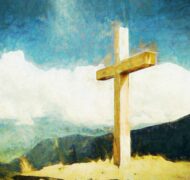3 Reasons Easter Matters for Your Work
Blog / Produced by TOW Project
The hope of Christians lies in Jesus’ work on the cross and his resurrection. What does the resurrection, which we celebrate during Easter, mean for one of the most consuming parts of our lives--our work? In his book The Heavenly Good of Earthly Work, Darrell Cosden points to the bodily resurrection of Jesus to propose that our work matters to God. He makes the following three points.
1. The resurrection affirms the goodness of the material world.
After the resurrection, Jesus was not a disembodied being, but a corporeal being. We even catch glimpses of Jesus eating.
The world is the good creation of God (Gen. 1). The material world is not an afterthought, or a mere prelude to heaven, but an expression of God’s glory, and the basis upon which his creatures may praise him. While we must remember the world is always contingent upon God, and that the present world order is subject to considerable shaking, it is equally important to remember that the world as God’s creation stands meaningfully in his presence, and is designed for his praise. [1]
Human beings are not only products of God’s creation, we are also co-creators with him. Like his Son, we are called to the work of ordering the world. “What are human beings that you are mindful of them, or mortals, that you care for them? You have made them for a little while lower than the angels; you have crowned them with glory and honor, subjecting all things under their feet” (Heb. 2:6-8, quoting Psalm 8).
Therefore our work is meant to resemble God’s work. It has undying value. When we make computers, airplanes and shirts, sell shoes, underwrite loans, harvest coffee, raise children, govern cities, provinces and nations, or do any kind of creative work, we are working alongside God in his work of creation. [2]
2. The resurrection demonstrates that there is continuity between the present world and new creation.
Cosden explains, “Jesus’ nail-scarred hands and feet are the prototype for the coming new creation. What we find true in his body, we also find true in this vision. What we have done—although it is ambivalent at best on its own—once redeemed and transformed, does find a home in the new creation.”
Even if there is life beyond the fallen state of the present world, our work would be in vain if the new world were completely disconnected from the present one. At most, it would launch us (and perhaps others) into the new world. But we have already seen that work done according to God’s ways survives into eternity (1 Cor. 3:10-15).
In the second half of 1 Corinthians chapter 15, Paul develops this matter further by stressing a fundamental continuity between pre- and post-resurrection bodily existence, in spite of vast differences in their respective substances. “This perishable body must put on imperishability, and this mortal body must put on immortality” (1 Cor. 15:53). Our soul does not change out the old body into a new body—as if donning a new suit of clothes—but our present body “puts on immortality.” The old continues into the new, though radically transformed. It is precisely this continuity that lends meaning to our present existence and guarantees that our labor for God is of lasting value. [3]
3. The resurrection is a sign that new creation, while not fully realized, has been initiated.
Jesus’ crucifixion was the deathblow for a world system founded on pretensions of human power and wisdom. His resurrection marks the definitive intrusion of God’s ways into the world. The reign of God’s kingdom has not yet taken in the entire earth, but Christ governs all those who will follow him. [4]
“Easter was when Hope in person surprised the whole world by coming forward from the future into the present.” - N.T. Wright, Surprised by Hope: Rethinking Heaven, the Resurrection, and the Mission of the Church
Excerpts from the Theology of Work Bible Commentary:
[1] The Throne Room of God (Revelation 4 and 5)
[2] Christ Created and Sustains the World (Hebrews 1:1-2:8)
[3] Our Work is Not in Vain (1 Corinthians 15:58)
[4] Jesus' Death, Resurrection and Commissioning of His Followers (Matthew 27-28)





